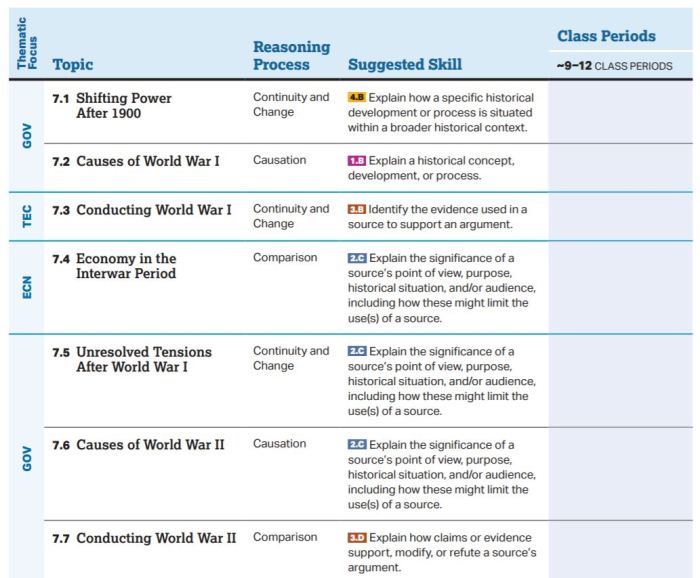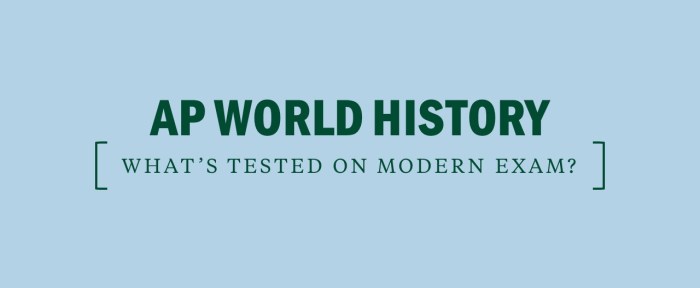Ap world history unit 5 progress check mcq answers – Embark on a captivating exploration of AP World History Unit 5 with our comprehensive guide to the Progress Check MCQ Answers. Delve into the profound impact of the Mongol conquests, unravel the pivotal moments of the Scientific Revolution, and witness the transformative power of the Protestant Reformation on European society.
This guide will illuminate the intricacies of this era, empowering you with a deeper understanding of its key concepts, terms, and global connections.
As we delve into the complexities of AP World History Unit 5, our focus will encompass key empires of the early modern period, drawing comparisons between the European Renaissance and the Chinese Ming Dynasty. Through the analysis of primary source documents and visual representations, we will uncover the historical significance and implications of this transformative era.
AP World History Unit 5 Progress Check MCQ Answers

The AP World History Unit 5 Progress Check MCQ Answers provide students with an opportunity to assess their understanding of the key concepts and events covered in the unit. These questions test students’ knowledge of the Mongol conquests, the Scientific Revolution, and the Protestant Reformation.
The Mongol conquests of the 13th century were significant for several reasons. First, they led to the creation of the largest contiguous empire in history, stretching from Eastern Europe to China. Second, they facilitated the exchange of ideas and goods between different parts of the world, leading to cultural and technological advancements.
Third, they had a lasting impact on the political and social landscape of Eurasia.
The Scientific Revolution was a period of great intellectual and scientific change that began in Europe in the 16th century. It was characterized by a shift from reliance on ancient authorities to a more empirical approach to knowledge. This led to the development of new scientific instruments and methods, as well as new theories about the natural world.
The Protestant Reformation was a religious movement that began in Europe in the 16th century. It was led by Martin Luther and other reformers who challenged the authority of the Catholic Church. The Reformation led to the establishment of new Protestant denominations and had a profound impact on European society and politics.
Key Concepts and Terms, Ap world history unit 5 progress check mcq answers
The key concepts and terms associated with AP World History Unit 5 include:
- Mongol Empire
- Scientific Revolution
- Protestant Reformation
- Renaissance
- Ming Dynasty
- Global trade
- Exploration
- Imperialism
These concepts and terms are essential for understanding the major events and trends of the early modern period.
Comparative Analysis
The early modern period saw the emergence of several powerful empires, including the Ottoman Empire, the Safavid Empire, and the Mughal Empire. These empires shared some similarities, such as their centralized governments and their reliance on gunpowder technology. However, they also had significant differences, such as their religious and cultural traditions.
The European Renaissance and the Chinese Ming Dynasty were two major cultural movements that occurred during the early modern period. Both movements were characterized by a renewed interest in classical learning and a flowering of art and literature. However, the Renaissance was more focused on secular themes, while the Ming Dynasty was more focused on Confucian values.
Historical Documents
Primary source documents are essential for understanding the past. One important document from AP World History Unit 5 is the “Letter from Marco Polo to Kublai Khan.” This letter provides a firsthand account of the Mongol Empire and its vast extent.
Visual Representations
Visual representations can help to illustrate the key events and trends of the early modern period. A timeline of the major events of the period can be helpful for understanding the chronological sequence of events. A map of the world during the early modern period can help to show the extent of global trade and exploration.
Global Connections
The early modern period was a time of increasing global connections. Trade and exploration led to the exchange of goods, ideas, and technologies between different parts of the world. This had a profound impact on the development of different societies.
Q&A
What are the key concepts covered in AP World History Unit 5?
AP World History Unit 5 explores the major turning points and concepts of the early modern period, including the Mongol conquests, the Scientific Revolution, and the Protestant Reformation.
How can I prepare for the AP World History Unit 5 Progress Check MCQ?
To prepare effectively, familiarize yourself with the key concepts, terms, and events covered in Unit 5. Utilize practice questions and review primary source documents to enhance your understanding.
What is the significance of the Mongol conquests in the 13th century?
The Mongol conquests established the largest contiguous empire in history, facilitating cultural exchange, trade, and the spread of ideas across Eurasia.


